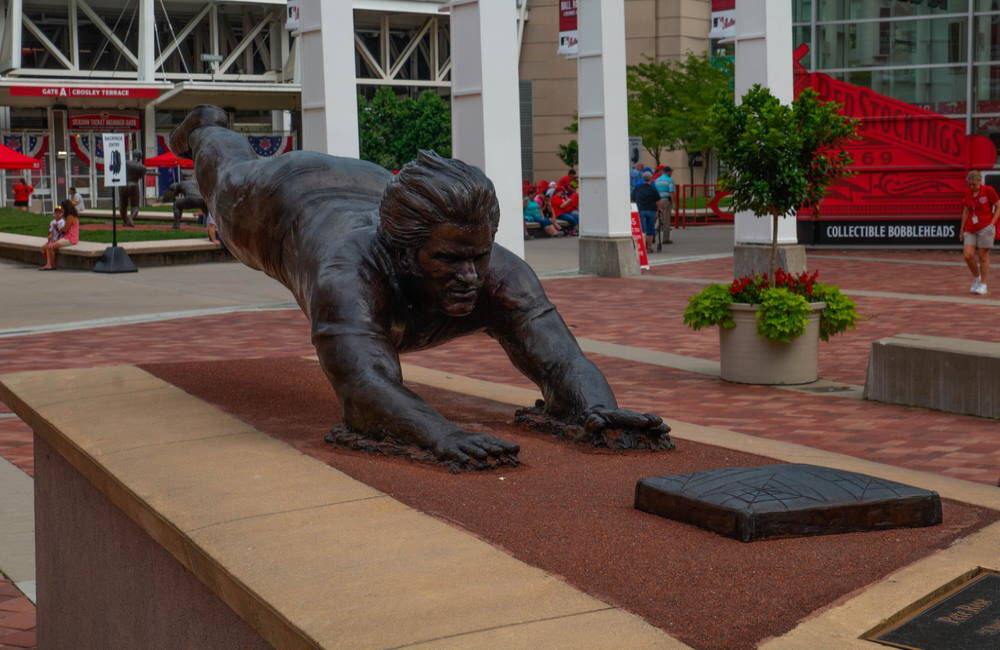From earning the Rookie of the Year award in 1963 to becoming the all-time hits leader in Major League Baseball history in 1985, Pete Rose earned his nickname “Charlie Hustle.” Unfortunately, he also became one of the most controversial players in baseball history after a league investigation found that he betted on baseball.
Much like “Shoeless” Joe Jackson before him and Barry Bonds after him, Rose has become a figure of debate that has intensified in his retirement years (Rose’s last season was in 1986). He remains ineligible to participate in baseball or enter the Hall of Fame.
Barry Bonds MLB Career and Early Life
Pete Rose’s Early Career
Peter Edward Rose was born April 14, 1941, in Cincinnati, Ohio. He played both baseball and football for Western Hills High School. Rose repeated a year in high school, using up his sports eligibility by his senior year. So, he instead played for a Double AA team in Lebanon, Ohio.
His uncle, Buddy Bloebaum, who did scouting work for the Reds, brought the young player to the attention of the big club. They decided to sign him in 1960 after his graduation from high school.
He played for the Geneva (New York) Redlegs in 1960, the Tampa Tarpons in 1961 and the Macon Peaches in 1962. At every stop, he swung the bat well and started in the field, playing second base. The Reds invited him to spring training in 1963, and he made the team, making his MLB debut on Opening Day in 1963.
Rose started his career going 0-for-11. It was not a sign of things to come.
Pete Rose’s Major League Career
Even casual fans know what Rose accomplished over the next two decades. In his first season, Rose won Rookie of the Year honors, hitting .273 with 101 runs scored. He played for the Reds from 1963 through 1978, playing on World Series-winning clubs in 1975 and 1976. He then played for the Philadelphia Phillies from 1979 to 1983, winning a World Series with that club in 1980.
He finished his career in Cincinnati as a player-manager from 1984 to 1986. He also:
- Led the league in batting average three times (1968, 1969, 1973)
- Led the league in hits seven times (1965, 1968, 1970, 1972, 1973, 1976, 1981)
- Played on 17 All-Star teams
- Won National League MVP in 1973
- Set the records for career hits (4,256), career singles (3,215), career games played (3,562), career at-bats (14,053) and career plate appearances (15,890)
He also became known for some infamous incidents. For example, in the 1970 All-Star game, an exhibition game meant to showcase MLB’s best talent. Rose crashed into Cleveland Indians catcher Ray Fosse to score the winning run from second base. Fosse, who was in his first full year in the majors, suffered a fractured and separated shoulder and never hit as well as he had in the first half of 1970 (16 home runs, a .313 average).
Rose also received a 30-day suspension for shoving an umpire in a game in 1988 (he stayed on as Reds manager after his retirement as a player until Aug. 24, 1989).
Best Moments in Phillies Baseball
Gambling on Baseball
Despite his incredible accomplishments on the field, Rose cannot have a role with MLB or become a member of the Hall of Fame because an investigation by baseball found that Rose had bet on baseball, including 52 games involving his own team. The report said he bet as much as $10,000 a day.
Baseball rules forbid betting on any team, not just your own. But the implication of betting on his own team caused the most publicity. As manager, Rose had control over decisions that could impact the outcome of games. Rose has denied he ever did anything to help himself win a bet.
On Aug. 24, 1989, Rose voluntarily accepted a permanent place on baseball’s ineligible list. He has since filed numerous times for reinstatement with no success.
In 1990, Rose also pled guilty to tax evasion for not reporting income made on selling his autograph, memorabilia and horse betting wins. After many years of denying he bet on baseball, Rose finally admitted he did in the 2004 book, “My Prison Without Bars.”


Leave A Comment